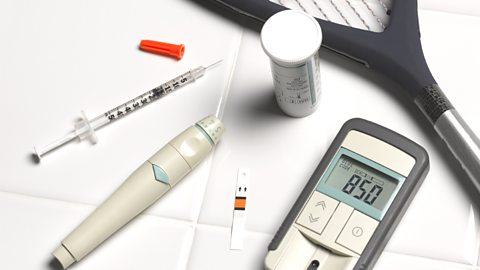Diabetes, alcohol and obesity
Sometimes homeostatic mechanisms are disrupted by lifestyle choices or by the onset of disease. In these cases help is required to keep the body in balance.
Diabetes
Diabetes is a condition in which the blood glucose levels remain too high. It can be treated by injecting insulinA hormone that regulates the level of sugar in the blood and can be produced by genetically modified bacteria.. The extra insulin causes the liver to convert glucoseA simple sugar obtained from carbohydrate foods. It is used to release energy during respiration. into glycogenThe storage form of glucose in animal cells., which reduces the blood glucose level. There are two types of diabetes - type 1 and type 2.
Type 1 diabetes
Type 1 diabetes is caused by damage to the beta cells in the pancreasLarge gland located in the abdomen near the stomach which produces digestive enzymes and the hormone insulin. which produce insulin. The problem can be inherited, but can also be caused by contracting particular viruses and the bodyÔÇÖs response to them. As a result people with type 1 diabetes produce little or no insulin.
It can be controlled by:
- following a low sugar/carbohydrate diet
- injecting insulin
- possible transplant of pancreatic tissue

People with type 1 diabetes have to monitor their blood sugar levels throughout the day. Their levels of physical activity and their diet affect the amount of insulin needed.
They can help to control their blood glucose level by being careful with their diet (eating foods that will not cause big spikes in their blood sugar level) and by exercising (which can lower blood glucose levels due to increased respirationChemical reaction that takes place inside living cells, which uses glucose and oxygen to release the energy organisms need to live. Carbon dioxide and water are by-products of respiration. in the muscles).
Type 2 diabetes
Type 2 diabetes is caused by a personÔÇÖs body becoming resistant to insulin. It can be controlled by diet and exercise. There is a link between rising levels of obesityThe medical term for being very overweight, owing to the excessive accumulation of body fat. and increasing levels of type 2 diabetes.
Lifestyle
Eating too much food over a long period can contribute to the development of type 2 diabetes. Other lifestyle choices can also contribute to the onset of disease such as:
- drinking too much alcohol
- misuse of drugs
Alcohol
Alcohol, even in small amounts, increases the bodyÔÇÖs reaction time. This could have fatal consequences if a person is driving a car under the influence of alcohol.
It is also addictiveSomething that is addictive is habit-forming. It creates a dependency so that more of it is wanted.. People can become dependent on the use of alcohol and suffer withdrawalSymptoms felt as a result of stopping using an addictive substance. symptoms without it.
Continuing to use alcohol can cause long term physical damage to major organs such as the liver and circulatory system.
More guides on this topic
- Classification and biodiversity ÔÇô WJEC
- Cell division and stem cells ÔÇô WJEC
- DNA and inheritance ÔÇô WJEC
- Variation ÔÇô WJEC
- Mutation ÔÇô WJEC
- Evolution ÔÇô WJEC
- The nervous system ÔÇô WJEC
- The role of the kidneys in homeostasis ÔÇô WJEC
- Micro-organisms and their applications ÔÇô WJEC
- Disease, defence and treatment ÔÇô WJEC
- Video playlist